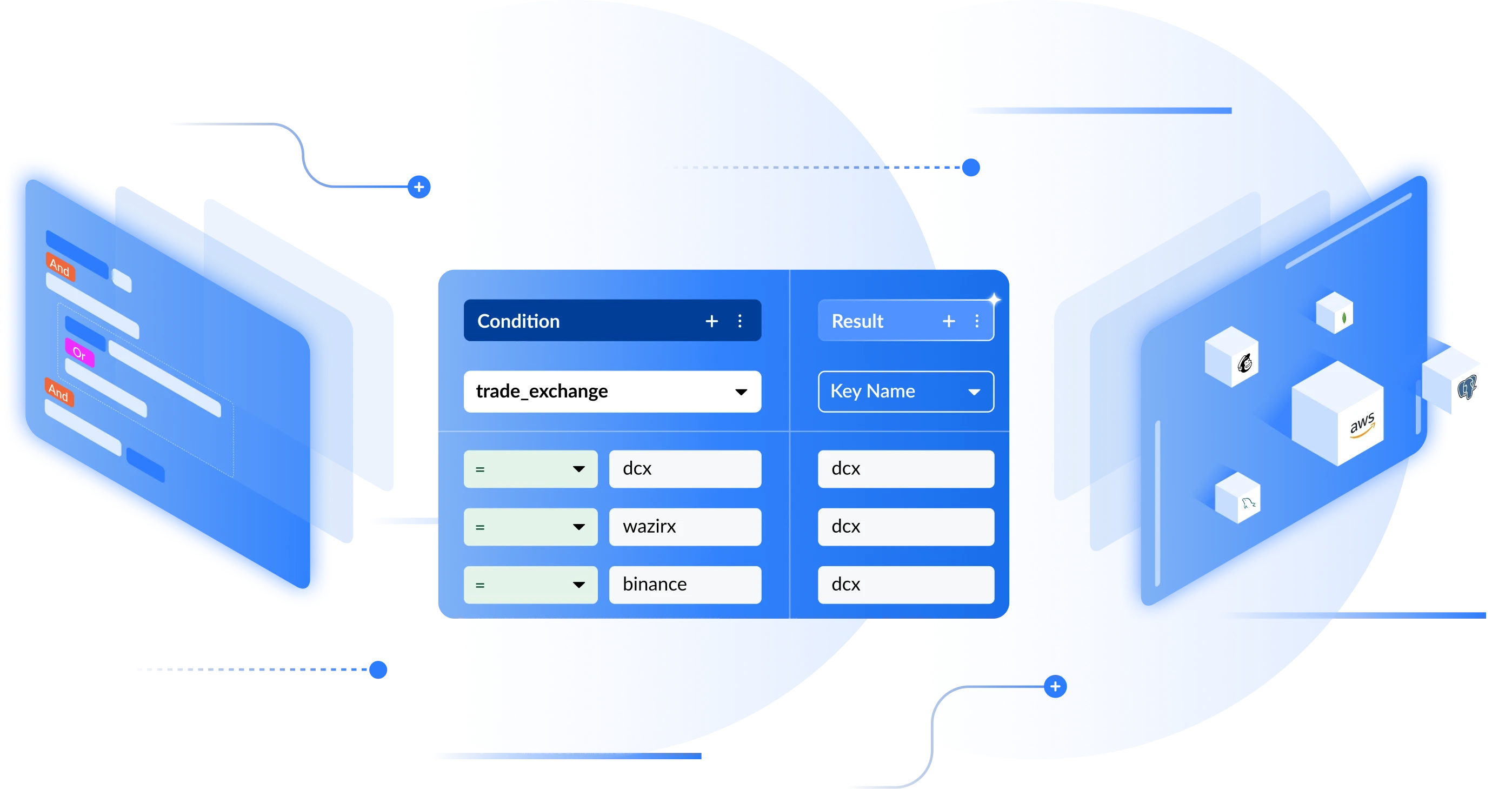Stop draining 15–50 engineering hours each week on DRL file edits, test harnesses and redeployments. Nected lets you migrate in days, empower non‑technical teams through a visual, no‑code interface and eliminate hidden costs, without rewriting your decision logic.




Current Drools users are hitting the same walls over and over. If you're researching alternatives, you've probably experienced these pain points firsthand:






These aren't isolated incidents. Here's what actual Drools users told us:
Senior Software Engineer
Backend Engineer
Software Developer
Platform Engineer
Before you invest more time and money into Drools, consider what staying costs you:
Total Cost of Ownership

.svg%20(1).webp)
| Middleware & Databases | $100K–$250K | $60K–$180K | $0 |
|---|---|---|---|
| Infra (1000 tps) | $200K–$300K | $150K–$375K | $70K–$95K |
| Implementation | $50K–$130K | $80K–$200K | $15K–$36K |
| Implementation Time | Months–quarter | 3–6 months | Days–weeks |
| Upgrades | $0 | $15K–$60K | $0 |
| Training & Onboarding | $0 | $48K–$144K | $0 |
| Ops & Admin | $100K–$133K | $100K–$200K | $0–$36K |
| Change Mgmt & Deployments | $100K–$175K | $100K–$200K | $0–$36K |
| Enterprise-grade Platforms | Built in | $50K–$150K | $0 |
| Time to Enterprise Features | Built in | 6–12 months | Built in |
| Tech Debt | N/A | $50K–$180K | N/A |
Drools slowed them down with code-heavy logic and zero workflow support. Nected helped them move faster, scale smarter, and hand control back to the teams that need it. Here’s what they have to say after making the switch:
Director of Product Management (Ed-Tech)
Financial Services
Apparel & Fashion
Administrator
Unlike Drools, Nected bridges the gap between technical power and business usability:




Migrating away from Drools doesn’t have to be a multi‑month project. Our AI‑powered converter ingests your DRL files and turns them into Nected’s DSL in hours. Run both systems side‑by‑side in parallel, validate outputs on real data, then gradually cut over at your own pace. If anything doesn’t look right, roll back instantly. Over 200+ teams have made the move with 98 % success — no rewrites, no downtime.
.webp)
At Nected, we don’t just offer another automation tool—we provide a frustration-free alternative to rigid, outdated decision engines.
Most teams complete migration in 2–4 weeks. We provide rule mapping, data migration tools and dedicated support. You can run both systems in parallel during transition to eliminate risk.
Absolutely. Nected supports decision trees, nested conditions and enterprise‑scale rule sets. Many customers migrate rules that were impossible to simplify in Drools.
Nected includes pre‑built connectors for popular systems and REST APIs for custom services. Your workflows continue uninterrupted.
Including development, maintenance and operational costs, Nected typically costs 60–80 % less than maintaining Drools over 3–5 years.
Every migration includes specialist support, success guarantees and rollback protection. We've migrated 200+ teams with a 98 % success rate.
Yes. Nected is designed for high throughput. It auto‑scales horizontally across clusters, delivering sub‑200 ms response times even under extreme load.
Nected comes with SOC‑2 Type II, ISO 27001 and GDPR readiness built in. Role‑based access control, audit trails and data encryption at rest and in transit are standard.
Choose SaaS (zero maintenance), private cloud or on‑premises to meet your security and residency requirements.
Invocations refer to the number of times your workflows/rule is triggered via API, cron or other trigger. It will count the parent rule/workflow and can have as many rules, nodes within it. This metric is often used for billing purposes. Compared to other products, invocations as a billing metric can be more cost-effective and transparent, aligning closely with your actual usage and needs. It ensures you pay for the value you receive, rather than flat rates or less relevant metrics.
If you exceed, you'll be charged based on additional usage and will be added in your monthly charge. In case of payment failure after grace period, your plan will be reverted to free trial limiting your monthly execution and # of rules/flows as per free plan, however all your existing rules/workflow data would be kept intact.
Firstly, we do not have a vendor lock-in, so you can cancel anytime you want. However, if you decide to cancel once your subscription for a given period has started then you would be able to cancel at the time of the next billing cycle only.
Yes, you can typically upgrade your Nected plan at any point during your billing cycle. The upgrade process is usually straightforward, often involving just a few clicks in your account settings. Upgrading mid-cycle may involve prorated charges for the higher-tier service.
The best plan depends on your specific needs, such as the expected number of invocations, the complexity of your workflows, and the level of support you require. It’s a good idea to start with a basic plan and upgrade as your needs evolve, especially if you're new to Nected. Moreover, you can also write to us at assist@nected.ai and we will help you figure out the best plan for your brand.
Yes, Nected usually offers assistance in setting up and creating a Proof of Concept (POC), especially under certain plans. This assistance can include access to customer support, documentation, and possibly dedicated account management.
The Startup and Growth plans typically provide basic to enhanced support, including access to customer service through email or chat, a knowledge base, and possibly community forums. Response times and the extent of personalized assistance may vary between these plans.
The on-premise plan generally offers the most comprehensive support, including dedicated account managers, 24/7 support, and tailored assistance for deployment, maintenance, and troubleshooting. This plan is best suited for businesses with extensive, mission-critical use of Nected.




Most teams complete migration in 2–4 weeks. We provide rule mapping, data migration tools and dedicated support. You can run both systems in parallel during transition to eliminate risk.
Absolutely. Nected supports decision trees, nested conditions and enterprise‑scale rule sets. Many customers migrate rules that were impossible to simplify in Drools.
Nected includes pre‑built connectors for popular systems and REST APIs for custom services. Your workflows continue uninterrupted.
Including development, maintenance and operational costs, Nected typically costs 60–80 % less than maintaining Drools over 3–5 years.
Every migration includes specialist support, success guarantees and rollback protection. We've migrated 200+ teams with a 98 % success rate.
Yes. Nected is designed for high throughput. It auto‑scales horizontally across clusters, delivering sub‑200 ms response times even under extreme load.
Nected comes with SOC‑2 Type II, ISO 27001 and GDPR readiness built in. Role‑based access control, audit trails and data encryption at rest and in transit are standard.
Choose SaaS (zero maintenance), private cloud or on‑premises to meet your security and residency requirements.

Project Manager

Business Analyst

IT Consultant

Investment Banker

Project Manager

Business Analyst

IT Consultant

Investment Banker
C/O Zime 691 S
Milpitas Blvd Suite 217,
Milpitas, CA 95035
+1 720 575 2906
11th Floor, Indiqube, Tower B
Vatika Towers Sector 54,
Gurugram, Haryana - 122022
+91 8368389921

%20(1).webp)
